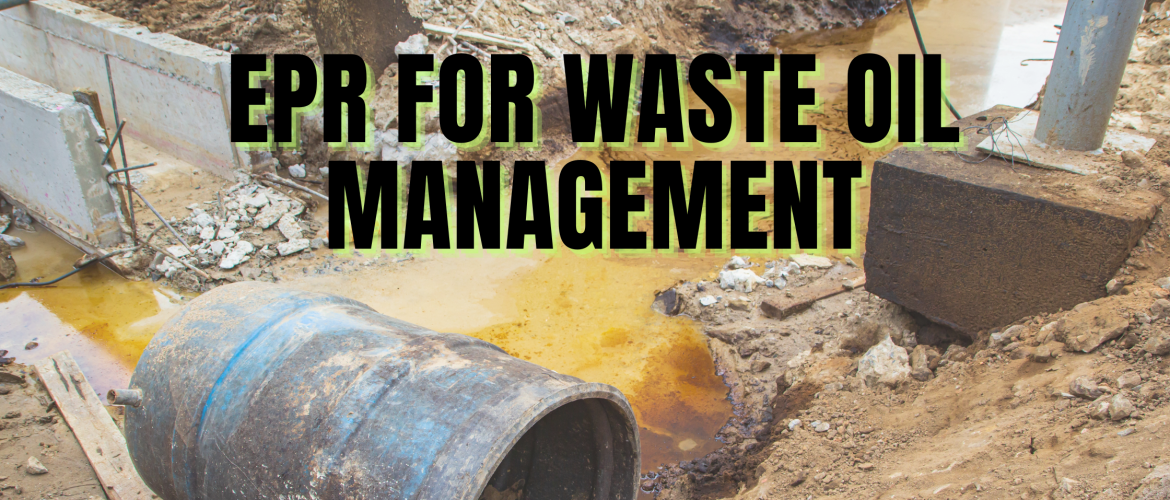Introduction
The world is facing an ever-increasing challenge in managing waste, with hazardous materials like waste oil posing a significant threat to the environment and public health. As the demand for energy continues to rise, so does the generation of waste oil, making it crucial to adopt effective and sustainable waste management strategies. One such approach gaining traction globally is Extended Producer Responsibility (EPR). In this blog, we will explore the concept of EPR and its application for waste oil management.
Understanding Extended Producer Responsibility (EPR)
Extended Producer Responsibility is an environmental policy framework that holds manufacturers and producers responsible for the entire life cycle of their products, including their post-consumer waste management. The aim is to incentivize producers to design products with reduced environmental impact and promote recycling and proper disposal methods. EPR shifts the burden from municipalities and taxpayers to producers, making them accountable for the environmental impacts of their products.
EPR for Waste Oil Management
Waste oil, which includes used motor oil, industrial lubricants, and cooking oil, poses serious environmental risks if not handled properly. Improper disposal or accidental spills can contaminate soil, water bodies, and groundwater, leading to long-term ecological damage. By implementing EPR for waste oil, we can address these challenges and encourage sustainable waste management practices:
1. Producer Responsibility: Under an EPR system, oil manufacturers and producers become responsible for the collection, recycling, and safe disposal of waste oil generated from their products. This creates a powerful economic incentive for producers to design oil products with minimal environmental impact and to establish effective recovery systems.
2. Recycling and Reuse: EPR programs foster the development of recycling and reprocessing facilities for waste oil. Instead of treating waste oil as a useless byproduct, it can be re-refined into base oils or used as a valuable raw material in various industries. Recycling waste oil not only conserves natural resources but also reduces greenhouse gas emissions and energy consumption.
3. Consumer Awareness: EPR encourages public awareness regarding waste oil disposal. Producers can educate consumers about the importance of recycling used oil and provide them with convenient collection points or guidelines for proper disposal. This collaborative effort ensures that waste oil is appropriately managed right from the point of generation.
4. Funding for Sustainable Initiatives: EPR programs can establish funding mechanisms through eco-fees or levies charged to producers. These funds can then be used to support research and development of eco-friendly technologies, waste management infrastructure, and environmental awareness campaigns.
5. Collaboration with Stakeholders: Implementing EPR for waste oil management requires collaboration between producers, government agencies, recycling facilities, and the general public. By working together, stakeholders can create an efficient and effective waste oil management system that benefits the environment and the economy.
Case Studies of Successful EPR Implementation
Several countries have already implemented EPR for waste oil management with encouraging results. For instance:
– Germany: Germany has a well-established EPR system for waste oil, which has led to high recycling rates and reduced environmental contamination.
– Canada: The Canadian Used Oil Management Association (CUOMA) oversees the collection and recycling of used oil and related materials, effectively applying the principles of EPR.
Conclusion
Extended Producer Responsibility (EPR) offers a promising solution for the sustainable management of waste oil. By making producers accountable for their products’ entire life cycle, EPR incentivizes responsible production, recycling, and disposal practices. As more countries and industries adopt EPR for waste oil management, we can mitigate the environmental impact of waste oil and move towards a more sustainable and greener future. However, successful implementation relies on cooperation between stakeholders and a collective commitment to environmental stewardship. Let us embrace EPR and pave the way for a cleaner, healthier planet.
If you need further assistance or guidance in obtaining your EPR certificate, do not hesitate to contact our experts.



